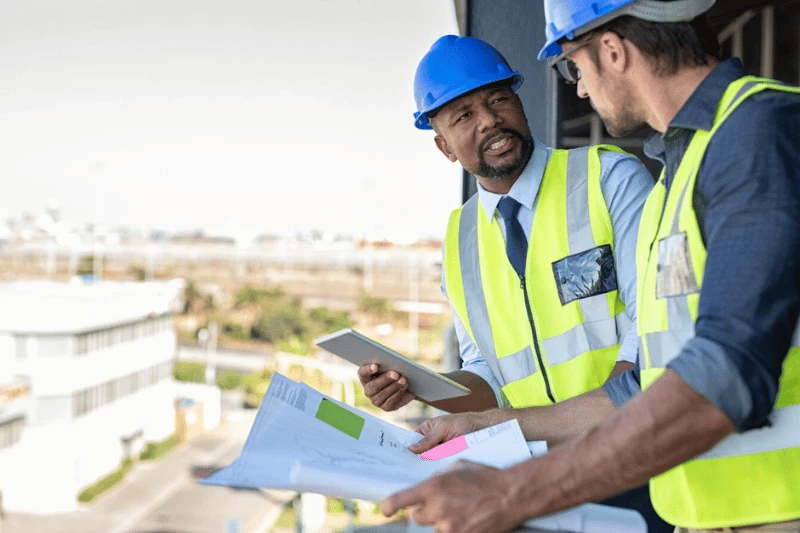
How To Improve Relationships With Construction Subcontractors – A Guide For General Contractors
Building and maintaining good subcontractor relationships is a key part of managing a healthy and profitable construction business, especially with labour shortages impacting the UK sector. This article covers the key steps to maintaining productive relationships with your subbies.
 5 mins
5 mins
Written by Carol Massay
Subcontractors are vital to any construction project, and cover a range of activities from pouring concrete to writing electrics. A network of talented subcontractors is essential to any general contractor, and time and effort must be spent in growing and maintaining those relationships to ensure projects run smoothly.
It is harder to keep up long-lasting subbie relationships within current construction trends such as more complex projects, data-driven planning and assessment and pressure on contractors we maintain the thin profit margins found in construction.
With labour and skills shortages increasing in the UK construction sector, subcontractors also hold a lot of power in being able to pick and choose projects. General contractors must now work harder at presenting an attractive deal to subcontractors.
Contractor and subcontractor relationships can also face frequent strain within a highly-regulated sector. It is a contractors’ responsibility to check on insurance, wage requirements, background checks and health and safety among others. Communication is key but a lot of the required communications can get lost in the fray.
This is a guide on the best approach to maintaining those essential relationships with subcontractors, covering every phase of the construction process, and the easiest ways to lose your subcontractors.
How To Improve Relationships With Construction Subcontractors
- Pre-Qualify Subcontractors To Start Your Relationship On The Right Foot
- Send Out High-Quality Bid Invites For Accurate Bids
- Ensure Your Agreements Are Fair and Clear
- Use Cloud Technology To Make Collaboration With Subcontractors Fast and Easy
- Establish A Consistent Line of Communication
- Ensure Project Managers Coordinate Subcontractors
- Track Progress Using Construction Management Software
- Be Flexible
- Let Subbies Know When You Are Happy With Their Work
- Pay Subcontractors On Time
Pre-Qualify Subcontractors To Start Your Relationship On The Right Foot
Before you embark on building relationships with subcontractors, it is important to ensure subcontractors are a good fit for your business and your projects before investing time and effort into building the relationship.
Having a pre-qualification process in place will help you and subcontractors save a lot of wasted time and ensures you get the right value of skills, experience and resources to produce the level of work you seek.
This usually begins with a pre-qualification questionnaire which is sent before subcontractors are invited to tender. This will help you with targeting the most appropriate subcontractors available and invest in those relationships.
Prequalification criteria should cover:
- Work History
- Technical Skills
- Resources
- Licenses
- Insurance and Safety Policies
- OSHA-approval
You can also request what their schedule and availability looks like.
Send Out High-Quality Bid Invites For Accurate Bids
Invitations to bid, sometimes your first contact with subcontractors, should be presented clearly. Spend some time on ensuring your requests for bid (RFBs) have all of their required documentation and information to attract high-quality bids from your subcontractors.
This includes:
- Being clear and honest about the scope of work involved
- Providing relevant documentation as part of your invitation to bid
- An expected schedule of dates if available
- Essential criteria required
It is also useful to divide a bid out into expected phases of a project, which helps subcontractors produce more accurate bids.
You may also want to host a pre-bid site visit or meeting to answer any specific queries around the project.
There are plenty of ways to intelligently manage your subcontractor bids, including a range of subcontractor bid management software available for contractors to send out and track their bids.
Access ConQuest Bid Management Software Tracks Subcontractor Bids For You
Our estimating software, Access ConQuest, is packed with useful features to help you pre-qualify subcontractors, send invites to bid, track and compare bids in real-time.

Ensure Your Agreements Are Fair and Clear
Ensuring your subcontractor agreements are detailed and transparent is the best way to maintain strong subcontractor relationships. If possible, it is best to discuss these terms and outlines in a pre-construction meeting so they can have their own input on the schedule and flag any snags they can see which may lead to rework or delays.
Your agreements with subcontractors should include:
- Clearly defined roles and responsibilities between the contractor and subcontractor
- Realistic expectations of quality and speed of work according to requirements of the project
- Full specifications of work required, broken down into detail
- Set hard deadlines for work completion, with consequences outlined for missing those hard deadlines
- Give clear protocols on how change orders will be communicated to the subcontractor
- Licensing and insurance requirements to ensure regulation compliance
- Expectations for communication and reports from the subcontractors
- Details of payment methods
Subcontractors should also be allowed to view a copy of the prime contract between you and your client to ensure total transparency and trust.
Use Cloud Technology To Make Collaboration With Subcontractors Fast and Easy
Collaboration with your subcontractors can easily be slowed down by poor or out-of-date technology, especially around communication and documentation.
While the construction industry remains one of the least digitised in the UK, digitising your documents using cloud storage, providing a space where both parties can view relevant documents, will help streamline communication processes.
Documents stored in the cloud can be easily accessed from anywhere, is safely backed-up and helps keep record-keeping immaculate within your business using digital audit trails.
Cloud technology also includes software where subcontractors can be kept informed of project changes through real-time updates. Construction management software can be used to keep every party within a construction project up-to-date on the status of the building scheme.

Establish A Consistent Line of Communication
As a contractor, you need to be open and easy to communicate with, so subcontractors can give updates, report snags and share any concerns around the project.
It is vital to keep communication open and transparent to build strong relationships with subcontractors who will return to work on future projects. Do not wait for subbies to contact you, but regularly give updates on the project from your side and ask how the work is going.
The advantages of regular communication are strong, as the majority of delays and cost overruns can ultimately be put down to poor or disconnected communication.
It is best to keep a single line of communication, rather than a mess of emails, WhatsApp messages and text messages. Agree a line of communication and stick to it. Many construction management software solutions contain functionality to help contractors and subcontractors communicate and track progress.
However, it is also important to use phone calls and in-person meetings when communication becomes challenging, such as a discussion around a project delay. Using the phone or in-person will often help defuse a situation and ensure solutions are found instead of a back-and-forth blame game which can become tense.
Quick responses to messages from subcontractors will also help improve your relationship, and the more communication you have, the more willing a subcontractor will be to share their own skilled insights on your project, which can prove invaluable.
Ensure Project Managers Coordinate Subcontractors
Coordinating subcontractor teams is the essential part of a construction project manager’s role, and the process should be consistently evaluated to help stop projects being derailed.
Coordination on the jobsite by the contractor is vital for helping subcontractors keep to their set schedules. In a survey of the industry in 2020, 54% of general contractors claimed poor subcontractor coordination was major contributing factor to project delays.
With profit margins in construction remaining narrow and poor subcontractor coordination being a major source of loss, it is worth investing in construction management software to help your project managers ensure your subcontractors are working where and when they are meant to be.
Many construction management software solutions also include the option for subcontractors to access and update the software, so project managers can know about potential schedule conflicts, delays and even availability of plant and machinery.
Investing in coordinating your subcontractors will help both improve relationships and minimise delays and extra costs.
Track Progress Using Construction Management Software
Project managers are not only responsible for coordinating subcontractors, but also need to track the daily progress of a project. In doing this, relationships with subcontractors can be improved through daily communication and updates. It is also a way for snags and issues to be spotted and corrected quickly before relationships face difficulties.
One of the best ways to do this is through using construction management software, especially that which uses real-time data to track progress across a project timeline, such as an ERP system. This helps contractors keep tabs on the work and progress of subcontractors in a way which is both transparent and unobtrusive.
Construction management software enables team leaders and project managers to coordinate multiple data points to help streamline progress tracking.
This also helps you set benchmarks and identify those subcontractors who produce better results than others, and will be worth working with again.
Be Flexible
One of the most important parts of maintaining a good relationship with your subcontractors is to allow for flexibility with your skilled workers. Every construction project will face some form of rework, delay, design change, schedule change or some other form of surprise. In order for both sides to navigate the unpredictable progress of a construction project, it is best for both to be flexible when both setting and tracking progress.
These changes are often out of the subcontractors’ control, and putting pressure on subcontractors to work to an impossible schedule which is no fault of their own is the fastest way to ruin a relationship with a subcontractor. It is important to be reasonable, fair and flexible when facing these difficulties.
Let Subbies Know When You Are Happy With Their Work
Communication shouldn’t end once a subcontractor has left the site and taken their pay. If you are happy with their performance, get in contact and let them know. You can also offer bonuses for finishing ahead of deadline to ensure the subcontractor will definitely want to work with you again, and feel motivated to do an excellent job.
If using construction management software, it is easy to review the performance of your subcontractors and send them feedback based on both your data analysis and your thoughts on the relationship overall.
If you lead with praise, you can also leave feedback on what can be improved the next time the subcontractor is hired to work on one of your schemes.
Everyone loves to feel appreciated and subcontractors are no different, so make the effort to let them know what a great job they did in the closeout phases of your project. It will only help to build further trust and loyalty.
Pay Subcontractors On Time
Slow payments are a major issue in the construction sector, leading to larger issues like growing bad debt. Sometimes slow payments can’t be helped due to contractors waiting for cash from their client to pass onto the subcontractor, but any company with healthy cashflow should be paying their subcontractors on-time and in-full according to agreements. This is the best way to maintain a trusting and respectful relationship with your subcontractors.
While payments should be withheld for poor quality work, it is best not to withhold pay based on minor issues. Damaging the relationship with the subcontractor will end up being more costly than any minor mistakes made. Paying on time for good work shows a level of respect which will be reciprocated the next time the subcontractor is needed.
Why You Need To Focus On Healthy Subcontractor Relationships
With the current construction skills gap in the UK sector, subcontractors can afford to be picky and blacklist any contractors who they don’t want to work with. Subcontractors also talk to eachother, and you don’t want your company to gain a reputation for poor communication, chaotic project management or an inability to pay for a good job done.
Subcontractors are a critical part of any construction project, and their contribution can be managed effectively by main contractors using the above steps. Building great relationships with subbies will help boost your future projects and help maintain a good reputation to help you secure the resources you need.
More construction software information, guidance and advice










